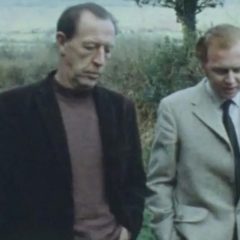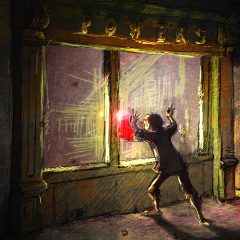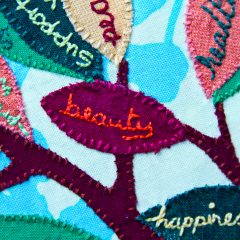Landscapes of Culture
by Colm McAuliffe Perhaps everybody does love Raymond (Williams), cultural theorist, border-crossing Welshman, television critic, elegant pipe smoker. A special event during Birkbeck's Arts Week 2018, Landscapes of Culture: Raymond Williams Thirty Years On, depicted Williams across three separate television landscapes traversing 1970, 1979 and 1988, through the Welsh borders of his home, the class upheaval of Cambridge where he taught, and the country house of Tatton Hall, to its natural finale: a strangely lit television studio where his legacy was discussed by an ideologically unusual array of politicians, academics and writers. These three documentaries – rarely seen since their original terrestrial broadcasts – formed part of the London-wide archive television season Radical Broadcasts: Theory On TV, which I have curated with Dr Matthew Harle, an Associate Research Fellow of Birkbeck’s School of Arts. Our intention with this season was not simply to provide a series of snug, nostalgic broadcasts of complex ideas on vintage television but to open up questions around the role of public intellectuals and public service broadcasting: why did the commissioners at the BBC deem it important to give televisual space to such complex interlocutors of theory and criticism? And what could it actually mean to consume television during this period when your viewing options could be limited to a documentary on the meaning of culture in society or Match of the Day? Landscapes of Culture was the final screening in our inaugural run of Radical Broadcasts screenings. Our decision to host this at Birkbeck Arts Week was crucial – we were conscious of the enthusiasm for his work across the Department of English and Humanities (and beyond), verified by the sell-out nature of the screening. However, selling-out is a charge one could never level at Williams. His laconic and uncompromising mannerisms, often embellished by a series of astonishingly beige, to the point of almost anti-colour, turtlenecks, made Williams a reassuring and compelling television presence. In Border Country (1970), we witness Williams debating and walking these landscapes of culture with a pre-fame Dennis Potter acting as the effervescent postulant, with Williams the avuncular cultural confidant. We later catch Williams in a domestic setting, briefly setting down to type at his rather insular desk before stepping away to awkwardly recline and face the camera in his leather swivel chair, a strangely modish item amongst his sparse living room; indeed, one could never question Williams’ commitment to both aesthetic and domestic realism. The Country and the City (1979), helmed by the acclaimed television director Mike Dibb (who worked wonders on John Berger’s Ways of Seeing BBC series earlier in the decade), was a more stylish and dramatic depiction of...
Gaelic Hardship
Certainly, I suffered Gaelic hardship throughout my life – distress, need, ill-treatment, adversity, calamity, foul play, misery, famine and ill-luck. As part of Birkbeck's Arts Week 2018, the Centre for Contemporary Literature supported an event that completed a trilogy of annual workshops on the brilliant first three novels by the Irish writer Flann O'Brien. Gaelic Hardship explored his third novel An Béal Bocht, written in Irish in 1941 and published under the name Myles na gCopaleen – which was the pen-name that Brian O'Nolan, the creator of 'Flann O'Brien', had adopted as a newspaper columnist. O'Nolan (1911-1966) refused to permit an English translation of the novel during his lifetime, just as he refused to countenance a second attempt to publish his rejected manuscript Third Policeman (written in 1940 and the subject of last year's workshop). Yet just as that novel was published a year after his death, so too in 1973 an English translation of An Béal Bocht appeared, as The Hard Life, translated by Patrick C. Power. It is in this form that this slim volume has become known to the largest number of readers, though there are still calls for a new translation and suggestions that Power's version omits important aspects of the original. Given the linguistic complexities involved, organizers Joseph Brooker and Tobias Harris (Birkbeck) this time enlisted the expertise of Eoin Byrne, who is working at the University of Galway on a project about bilingual writers including Samuel Beckett as well as Brian O'Nolan. After our introductions to the area and to O'Nolan's career trajectory, Eoin offered an incisive account of key issues around this novel, including the state of Irish-language publishing in the early 1940s and the 'Gaeligores' or Irish-language enthusiasts satirized in the novel. With members of the audience joining in discussion, the workshop was then enriched by readings of particular passages: Hugh Wilde recited an early passage where the English-speaking schoolmaster beats the protagonist's Irish name out of him, and N.J. Harris read the close of the novel, where poignancy seemed to take over from comedy. In the meantime we also looked at Myles na gCopaleen's satiric portrayal of a Gaelic festival at which numerous local Gaels die of rain, starvation, drink or exhaustion from excess of Gaelic dancing; Eoin read the passage aloud in Irish. An Béal Bocht / The Poor Mouth has perhaps been overshadowed by its brilliant precursors At Swim-Two-Birds and The Third Policeman, but this workshop placed it centre stage, reminding us of the ferocity of its irony and the sense that – as Eoin finally put it, deliberately echoing Richard Ellmann's words about James Joyce – we are still learning to be its contemporaries. A report on the event, by audience member, Charlotte Deadman, has...
The Economic Sublime
10th May 2018 G04, 43 Gordon Square As part of the Bloomsbury Lecture Series, we are glad to present Dr Chris Pak's lecture: "The Economic Sublime!": Utopia and Dystopia in Three Contemporary Science Fiction Novels. Contemporary science fiction novels engaging with utopia and dystopia focus their narratives on the social implications of economic and political choices made in response to, or in spite of, knowledge of the Anthropocene. Paolo Bacigalupi's The Water Knife (2015), Kim Stanley Robinson's New York 2140 (2017) and Cory Doctorow's Walkaway (2017) in particular use utopian structures and themes to portray and critique the economic, social and political trajectories implied by trends seen today. This talk asks how utopia and dystopia are configured in these three works of contemporary science fiction: whether they function as a form of critique, as a warning, or as experimental space for reflection on alternatives to contemporary socio-economic arrangements. Dr Chris Pak is the author of Terraforming: Ecopolitical Transformations and Environmentalism in Science Fiction, published by Liverpool University Press in 2016. He edited the Science Fiction Research Association's SFRA Review from 2014–2018 and is the current sub-editor of the Medical Humanities blog. Dr Pak's previous appointments include the Leverhulme-funded corpus linguistic project ‘“People,” “Products,” “Pests” and “Pets”: The Discursive Representation of Animals’ at Lancaster University from 2013–2016, and the Volkswagen Foundation-funded digital humanities project ‘Modelling Between Digital and Humanities: Thinking in Practice’ at King’s Digital Lab from 2017–2018. Image by dnlspnk, used under a CC BY-NC 2.0...
Close Reading + Digital Humanities
Friday 20th April 2018 2pm-5pm 114 (Keynes Library), 43 Gordon Square Birkbeck’s Centre for Technology and Publishing is pleased to present “Close Reading + Digital Humanities: A Dialogue”. Digital practices in literary studies have been at the forefront of recent debates about what it means to ‘read’ at scale. Meanwhile, conventional literary studies has followed the modernist paradigm of ‘close reading’, insisting on close textual attention. This afternoon brings together scholars of both approaches to investigate how one can inform the other, chart common goals and navigate potential tensions and anxieties. Each speaker will present for 25 minutes with Q+A, followed by a panel discussion. Please RSVP on the Eventbrite page. Contributors: Professor Martin Paul Eve Professor of Literature, Technology and Publishing Birkbeck, University of London Erik Ketzan PhD Candidate: Digital Humanities Birkbeck, University of London Dr. Richard Robinson Associate Professor, English Literature & Creative Writing Swansea University Dr. Gabriele Salciute Civiliene Teaching Fellow in Digital Humanities Technologies, Department of Digital Humanities Kings College London This event is generously supported by the Lorraine Lim Postgraduate Fund, Birkbeck, University of London. Image by Phillip Barron, used under a CC BY-NC 2.0...
Utopian Acts
Saturday 1st September 2018 In this ongoing historical moment it is easy to exclude utopianism from the conversation around radical action as a naive, unjustifiably optimistic distraction. However, as activist organisations around the world recognise, to demand a better, more utopian world is, in such circumstances, neither distraction or escape, but instead forms a moral and political imperative. Utopian Acts will be a one-day conference and festival concerned with investigating contemporary efforts to create new worlds and effect positive change within the fields of activism, art, and academia, whether or not this work is understood as explicitly utopian. By naming this event Utopian Acts, the organisers invite an interrogation of utopianism as produced by, and included within, radical action of various kinds. Ultimately, the event will be aimed at collapsing, disturbing, and making porous the boundaries between the avowedly abstract work of academia and the apparently concrete work of activism and art. Proposals are invited for contributions to this event, to be submitted by Friday 29th June 2018. Visit this page for more information. More details on the organisers of the conference are available here. Utopian Acts is supported by Birkbeck Institute for the Humanities and the Centre for Contemporary Literature. Image from Craftivism Collective, used under a CC BY-NC-ND 2.0...






Recent Comments